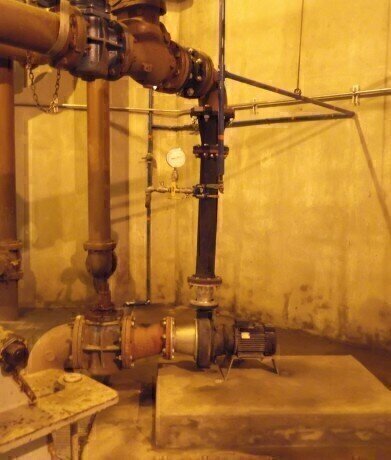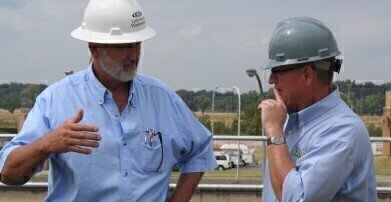-
 One of Landia's pumps at Little Rock taking up far less room on the plinth than the previous much larger screw impeller pumps
One of Landia's pumps at Little Rock taking up far less room on the plinth than the previous much larger screw impeller pumps -
 Joe Freyer (left) Maintenance Supervisor at the Fourche Creek Wastewater Treatment Facility with Art Savage from Landia
Joe Freyer (left) Maintenance Supervisor at the Fourche Creek Wastewater Treatment Facility with Art Savage from Landia
Water/Wastewater
Small Pumps Make a BIG Difference in Little Rock
Oct 15 2015
“When we took the first look at the Landia Pumps, our first response was to laugh,” said Joe Freyer, Maintenance Supervisor at the Fourche Creek Wastewater Treatment Facility (FCTF) in Little Rock, Arkansas. The pumps were small and did not resemble the big cast iron units they were used to.
With over 30 year’s experience, not much escapes the watchful eye of Joe and his 15 man team. Comprised of Master Electricians, Pump Mechanics, and Generator Technicians, this highly skilled team was concerned the new pumps would not perform well. However, those small pumps would go on to make a big impact and prove a wise investment.
The success of FCTF is widely known, although you would not know it by the modest demeanor of Joe and his team. Or perhaps it’s because their hectic schedule does not allow for small talk – they average 650 Work Orders per month. It is apparent to visitors of FCTF the staff takes great pride, and with enthusiasm, works hard to maintain it’s well being.
“We constantly check everything throughout the facility to ensure we are in good shape,” added Joe. “It’s an aggressive schedule but we thrive on it. We don’t wait until something breaks. Our software is designed to notify us and integrate with our Preventative Maintenance program. For example, Oil levels are checked once a month on our Submersible Pumps and we also inspect the Impellers, once every year. In the meantime we conduct visual checks – and we have a good ear too, and can detect when something doesn’t sound quite right with the equipment.”
This proactive mode, which also encompasses 28 Pump Stations and 3 Treatment Facilities, saves on potentially drastic repair bills and has virtually eliminated downtime. More importantly, it ensures Little Rock Wastewater achieves its stringent Discharge Permit. Serving a population of 183,000, the Fourche Creek Treatment Facility FCTF (43 MGD), the Adams Field Treatment Facility AFTF (72 MGD), and the Little Maumelle Treatment Facility LMTF (5-14 MGD), are all closely monitored by State and Federal entities. “They are always welcome at every visit.” Joe stated, because he and his team proudly believe a key part of their mission is simply to ‘do the right thing for the City of Little Rock and its residents.’
Although required to reduce pollutant loads by 85 percent, FCTF consistently achieves 90-95 percent removal through its physical and biological processes. An innovative secondary treatment facility with a Step-Feed activated sludge process, FCTF receives wastewater from southwest Little Rock via pressure lines from the College Station & Arch Street Pump Stations. FCTF also receives solids through a 5-mile Force Main from AFTF, which is a complete mix activated sludge facility.
Here, flow to the activated sludge secondary process goes through six rectangular Aeration Tanks, where a biological microorganism population utilises the incoming dissolved organic material in the wastewater as food. The biological organisms settle out in the secondary (final) Clarifiers and are returned to the activated sludge Aeration Tanks to maintain a viable microorganism population.
Sludge from both AFTF and FCTF are combined and then thickened at FCTC, prior to being introduces to one of four 1.2 million gallon primary Anaerobic Digestion Tanks. Held for approximately 30 days, at a constant 95°F, and completely devoid of any free oxygen, these tanks use naturally occurring bacterial to consume 55% of the organic solids in the thickened sludge to produce water, carbon-dioxide, sulfide, and most importantly Methane. The Methane gas is collected and piped to the Generator building where it is used as an alternative fuel source to provide up to 100% of the facility’s power, saving FCTF three quarters of a million dollars annually (over $2,000 per day). Approximately 1150 kW of power is produced, with around 850 kW for facility load and approximately 300 kW of that put back on the grid.
Those Landia Pumps Joe and his team first chuckled about, were introduced eight years ago to pump the Anaerobic Digester solids. They replaced a different manufacturers Screw Impeller Pumps, which had been failing mechanically. On the pedestals where the previous pumps sat, the Landia Model MPTK close-coupled Chopper Pumps take up only a third of the space.
“I have to admit, we have a little egg on our face,” admits Joe. “Those Landia Pumps have performed very well and continue to do so. They are tough machines and they have to deal with whatever gets through the Bar Screen at the Headworks. Primarily we take in domestic wastewater and get a lot of rags. We are also in a major Rice producing area, which means we receive some pretty tough effluent and with a pH of just 3, it needs chemical treatment before it enters the Digesters.”
Apart from typical preventative maintenance, there has been very little in the way of repairs required over the 8 years the Landia Pumps have been in use at FCTF. Those repairs were one rewind, two mechanical seals and a cutter.
“Approaching a decade, that’s almost nothing,” continued Joe. “Previously, with our old Screw Impeller Pumps we had to take them offline and remove them to clear the debris, which caused considerable downtime, but the Landia Chopper Pumps are far better at chopping the debris. They just keep running, which is a great track record considering some of the pumps run 24/7. We still have the original Impellers on them.”
In addition to the Landia Pumps, there are also half a dozen Landia Mixers installed throughout the Little Rock Wastewater treatment foot print – 3 at AFTF, 1 at the Arch Street Pump Station and 2 at the Little Maumelle Pump Station.
“Just like the Landia Pumps, the Landia Mixers have been equally efficient and very reliable,” concluded Joe. “Just recently we had our first real problem, which is quite a record in 8 years. “We clearly bought the best.”
Events
Jul 15 2025 Brighton, UK
Jul 23 2025 Sydney, Australia
Aug 24 2025 Stockholm, Sweden and online
Aug 27 2025 Busan, South Korea
Sep 02 2025 Mexico City, Mexico









.jpg)







